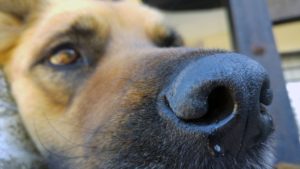Everything you wanted to know about K9 Cough and Influenza but were afraid to ask
Gesundheit, hounds! Is your dog coughing or sneezing? Don’t rush to quarantine your dog in a bubble. Instead, read the following answers to the most common questions associated with two of the most contagious respiratory diseases among dogs. Like chicken soup for the coughing canine’s soul, we hope they soothe you.

Is kennel cough the same as canine cough?
In a nutshell, yes. The term “kennel cough” is the most popular way to call it but it technically should be called “canine cough” since it is not limited to dogs in kennels. And if you want to impress your friends at the next party, the scientific name for it is “acute infectious tracheobronchitis.”
Your dog can catch canine cough at the dog park, saying hello to a four-legged friend down the street, or anytime they are near another dog who happens to have canine cough… or who recently had canine cough. It is very contagious, and so it is quite easy for dogs to pick it up. And if you’re thinking “well, I’ll just avoid dogs who are coughing,” think again. It can remain contagious for several weeks after symptoms resolved.
Now, that doesn’t mean you should put your dog in a bubble. Your dog may have been exposed to a dog who had canine cough and didn’t catch it (PS: you probably came in contact with all sorts of bacteria and viruses today, and you didn’t get sick). Just like with humans, stress tends to compromise their immune system, and so when they are confined to a kennel in a shelter or while being boarded, they are likely more stressed out, and thus more likely to catch it. Ah, if only they knew how to cover their cough with their paws!
Is kennel cough the same as canine influenza?
Not quite, but the answer is more complex than that. The canine influenza virus could be one of the causes of canine cough. However, canine cough can also be caused by a bacterial infection. Your vet would be able to diagnose it properly through laboratory tests.

Is canine influenza more deadly than canine cough?
Yes and no. Although neither of them are usually deadly and the majority of infected dogs experience mild symptoms, infection with canine influenza virus can lead to pneumonia and more severe diseases that are indeed deadly if left untreated. Very young or old dogs, or dogs who have weaker immune systems, are at a greater risk of secondary infections, which can result in more serious conditions. This doesn’t mean you should panic at the first sight of your dog coughing, but you should not ignore it either. Instead, make an appointment with your vet and monitor them closely for any and all symptoms: how much are they eating and drinking?, how often do they cough?, how long does the cough lasts for? is the cough trigger by anything in particular?, how is their energy level?, do they have any nose discharge?, are they sneezing more than usual?, etc. The more information you can provide to your vet, the better the diagnose will be.

Does the Bordetella vaccine protect them from canine cough and/or canine influenza?
Not necessarily. Dr. Brendan McKiernan, director of the University of Illinois Veterinary Teaching Hospital, explains that “even if you vaccinate, the vaccines are protective only after the booster, injected three to four weeks after the initial vaccination. […] Lastly, remember that no vaccine can be 100 percent protective.”
There is also a relatively new vaccine specifically for canine influenza (for the H3N2 virus), but again, all it does is minimize the likelihood of infection or the severity of the disease. A vaccine is a not an impenetrable shield against it. Your dog can still catch it even if they were vaccinated. There is a lot of controversy surrounding vaccines (both for humans and canines!), so the best thing is to consult with your vet. Don’t make any decisions based on what you find on the Internet, including this post.
Is reverse sneeze a symptom of canine cough or canine influenza?
Not at all. Reverse sneezes are pretty common among small dogs, especially dogs with a short snout (pugs, I’m looking at you). A reverse sneeze is exactly what its name implies: instead of air being expelled outwards (as in a normal sneeze), it is pulled rapidly in through the nose, which results in some very unpleasant noises and unsightly scenes, as if your dog looks pseudo-paralyzed in a strange stance and appears to be choking, having an asthma attack, suffering from a seizure or being possessed by demons. It’s actually none of the above. As bad as it looks, it is actually normal for some dogs, and all you can do is wait it out. Most times it is cause by too much exercise or excitement, by a slight irritation of the throat, or by pulling too much when walking on a leash.
The classic symptom of canine cough is a persistent, deep, dry cough, as if the dog were trying to expel some phlegm. It doesn’t look like an asthma attack, as with the reverse sneeze, and it is not in reaction to pulling too hard, or eating a treat too fast. Other symptoms include a runny nose or eye discharge. However, unlike when humans get a cold, their energy levels may or may not decrease, so the tell-tale cough is the best way to spot canine cough. What does it sound like? It’s hard to describe in words, but it would be something like this: cough-cough-cough-cough-hacking-gagging… brief period of silence… cough-cough-cough-hacking-gagging. Maybe I should let this video do the talking (or the coughing):
Is it possible my dog had canine cough, and it went away without any treatment?
Yes, indeed. However, it is always best to take your dog to the vet if your dog has a persistent cough. Coughing can also be a symptom of canine influenza, as well as other diseases, such as canine distemper virus, canine adenovirus, and canine parainfluenza virus, and it’s even difficult for the pros to tell them apart just by looking at the dog, so don’t try it at home; make an appointment with your vet so they can run the proper tests. Don’t diagnose your dog based on this blog post.
Do dogs catch influenza in the winter more often than in the summer?
No. Unlike human flu cases that tend to spike during the winter months, canine flu can be contracted year round. It has nothing to do with the weather.
Can I catch the flu if my dog has canine influenza?
Not that we know of! For now, there have not been any reports at all of humans contracting the virus, so go ahead and pet your dog and comfort them while they’re sick.
Author: Florencia Henshaw